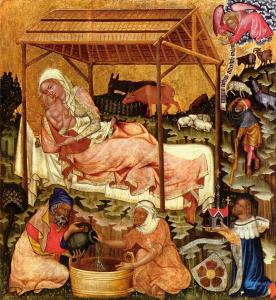
“Materialism” is said in many ways, almost all bad according to contemporary Christians. Sometimes it means “vanity” or “consumerism.” Otherwise, it can mean “atomism” or “Epicureanism.” In other contexts, the word denotes “the evils of modern philosophy, emphasizing the material realm, ignoring the spiritual. It’s the second usage I’d like to discuss (all too briefly) in this post. Taken in this sense, materialism is good. In fact, it’s the most responsible position for a Christian to take today (again—I’m at pains to make this clear—I am not endorsing rampant consumerism or vulgar Marxism. I like neither of these things; what I do mean to support is a complicated and vivacious philosophical positions with important lessons for how we should do politics today).
Let’s take a look at what Friedrich Engels, Marx’s notorious confrere, meant by the term:
According to the materialistic conception of history, the production and reproduction of real life constitutes in the last instance the determining factor of history. Neither Marx nor I ever maintained more. Now when someone comes along and distorts this to mean that the economic factor is the sole determining factor, he is converting the former proposition into a meaningless, abstract and absurd phrase. The economic situation is the basis but the various factors of the superstructure – the political forms of the class struggles and its results – constitutions, etc., established by victorious classes after hard-won battles – legal forms, and even the reflexes of all these real struggles in the brain of the participants, political, jural, philosophical theories, religious conceptions and their further development into systematic dogmas – all these exercize an influence upon the course of historical struggles, and in many cases determine for the most part their form. There is a reciprocity between all these factors in which, finally, through the endless array of contingencies (i.e., of things and events whose inner connection with one another is so remote, or so incapable of proof, that we may neglect it, regarding it as nonexistent) the economic movement asserts itself as necessary. Were this not the case, the application of the history to any given historical period would be easier than the solution of a simple equation of the first degree.
We ourselves make our own history, but, first of all, under very definite presuppositions and conditions. Among these are the economic, which are finally decisive. But there are also the political, etc. Yes, even the ghostly traditions, which haunt the minds of men play a role albeit not a decisive one. (A Letter to J. Bloch)
First, we should remind ourselves that Engels is not the end-all-be-all of Marxian thought. In fact, in some ways, he supported the sort of vulgar Marxism that led to reductionistic approaches to politics. But that’s just why it’s so fascinating to use him as a case study here. If the man often seen as the father of economic determinism seems to say “materialism is not economic determinism,” if a seeming reductionist can be shown to admit that his philosophy is not reductionistic, then we have no choice but to take more humanistic (and less deterministic) forms of Marxian materialism more seriously.
Engels says the final “determining factor” of actions is “history” (note that “determine” is not the same as “forces.” My being tired in the morning is one “determining factor” in why I might spill my coffee on myself, but other things play a part too: how much sleep I got, in what way I slept, whether I am used to how to grasp this particular mug, whether I am attempting to concentrate to avoid an accident, etc.). He also notes that materialism deals with “the production and reproduction of real life,” even admitting that religion and other ideas, the narratives we tell ourselves—whether true or false, play a role in shaping our actions. He also avows that we, indeed, make our own history.
If we take these propositions together, he seems to be admitting that history is not simply a determining engine. At minimum (and later materialists would disagree with him here), it is simply the “base,” that is to say the most important factor, a primary motivator (I’ll add here that this is similar to arguments capitalists make about self-interest being a main driver of behavior). But this “base” exists in a complex network of concerns, including “ideal” ones, meaning “immaterial” ones.

















